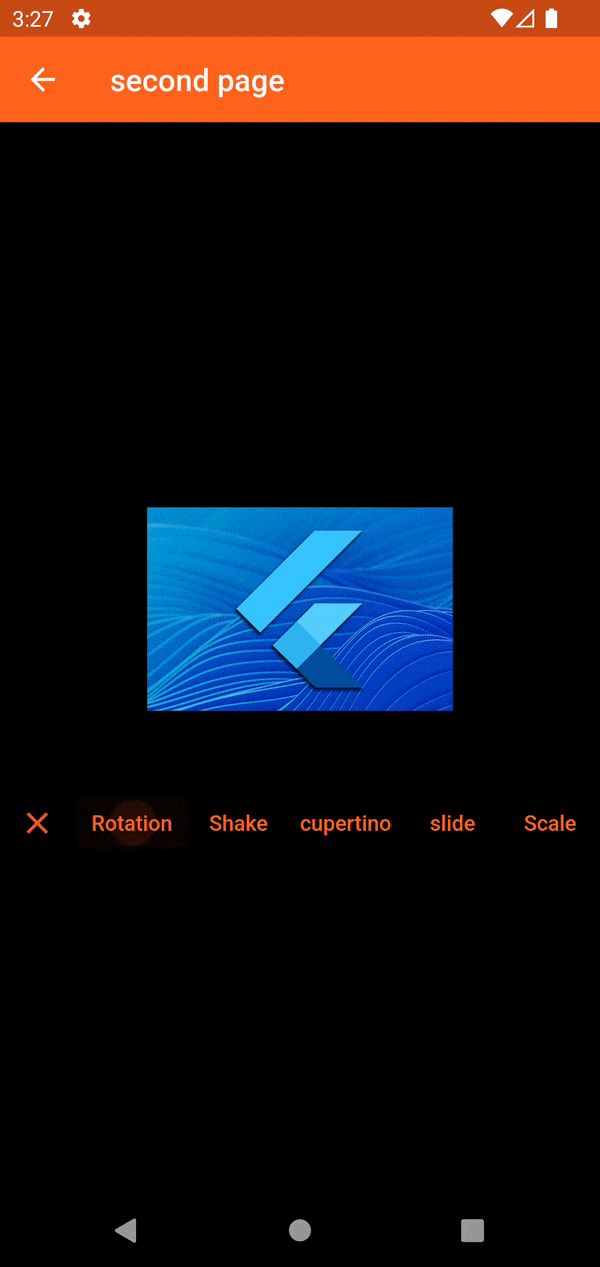easy_go 1.0.1  easy_go: ^1.0.1 copied to clipboard
easy_go: ^1.0.1 copied to clipboard
A Flutter package for easy routing and navigation
Easy Go #
Easy Go is a powerful Flutter package that makes navigation between pages a breeze. With a simple and intuitive API, this package allows you to easily navigate between pages with beautiful animations and custom transitions.
#Feature GIF (from project)

Features #
The package provides a wide range of features to enhance your app's navigation, such as:
- Support for custom page transitions and animations
- Provides an easy way to set transitions for each platform (iOS, Android, Web, etc.)
- Built-in animations such as slide, fade, and scale
- Support for named routes and automatic route generation
- The ability to pass data between pages
- Easy to debug and test
A simple and easy-to-use API that can be integrated seamlessly into your existing app
Getting started #
Add the package to your pubspec.yaml file:
dependencies:
easy_go: latest_version
import the package in your dart file:
import 'package:easy_go/easy_go.dart';
run the following command in your project's root directory to init the package:
easy_go generate_enum -n NamedRoutes -p lib/src/generated/NamedRoutes.dart
This will create a file named named_routes.dart in your project's root directory. This file will contain all the named routes in your app. You can add more routes to this file manually.
Setup the Package #
1.Pass the navigator key (Go.navigatorKey) to the MaterialApp widget
MaterialApp(
navigatorKey: Go.navigatorKey,
home: const HomePage(),
),
- To use named routes, you need to make sure that named_routes.dart is imported in your dart file.
- Create a Router Generator class that extends GoGenerator giving your customizations for each route. ex :
class RouterGenerator extends GoGenerator {
@override
Route<dynamic> goRoutes(RouteSettings settings) {
final namedRoute = routerName(settings); /// You must include that line
switch (namedRoute) {
case NamedRoutes.home:
return GoBuilder().build(
const HomePage(),
settings: settings,
transition: TransitionType.fade,
);
case NamedRoutes.secondPage:
return GoBuilder().build(
const SecondPage(),
settings: settings,
transition: TransitionType.fade,
);
case NamedRoutes.thirdPage:
return GoBuilder().build(const ThirdPage(), settings: settings);
case NamedRoutes.fourthPage:
return GoBuilder().build(const FourthPage(), settings: settings);
}
}
@override
Route<dynamic> undefineRoute() {
return MaterialPageRoute(
builder: (_) => const Scaffold(
body: Center(
child: Text('No route exists here ! '),
),
),
);
}
}
- Pass the Router Generator class to MaterialApp's onGenerateRoute parameter.
MaterialApp(
navigatorKey: Go.navigatorKey,
onGenerateRoute: RouterGenerator().goRoutes,
home: const HomePage(),
),
Usage #
Once you finished setting up the package, you can use it in your app by calling the Go class methods.
- For Simple navigation between pages
TextButton(
onPressed: () {
/// This will create a fade transition between the current page and the next page
Go.to(const SecondPage(), transition: TransitionType.fade,options:FadeAnimationOptions());
},
child: Text('Go to page 2'),
),
- For passing data between pages with named routes
TextButton(
onPressed: () {
/// This will create a fade transition between the current page and the next page
Go.toNamed(NamedRoutes.first, arguments: 'Hello World');
},
child: Text('Go to second'),
),
to get the data in the second page, you can use the following code:
class SecondPage extends StatelessWidget {
const SecondPage({Key? key}) : super(key: key);
@override
Widget build(BuildContext context) {
final data = context.arguments ;
return Scaffold(
body: Center(
child: Text(data), /// This will display 'Hello World'
),
);
}
}
Platform Specific Transitions #
By default Go provides a suitable transition for each platform ios , android and web.
To use a custom transition for a specific platform, you can use the GoBuilder class before running the app
ex :
void main() {
GoBuilder().initAppRouter(
config: PlatformConfig(
android: CustomPageRouterCreator(
parentTransition: TransitionType.slide,
parentOptions: const SlideAnimationOptions(
direction: SlideDirection.topToBottom,
),
),
/// ios: Add IOS Animation Options
/// web: Add Web Animation Options
),
);
runApp(MyApp());
}
This will create a slide transition for android and the default transition for ios (Cupertino Transition) and web.
Parameters #
- page: The page to navigate to
- transition: The transition type to use it can be one of the following:
- TransitionType.slide: Slide transition
- TransitionType.fade: Fade transition
- TransitionType.scale: Scale transition and many more ....
- options: The transition options to use for each transitionType
- SlideAnimationOptions: The options for the slide transition
- FadeAnimationOptions: The options for the fade transition and many more ....
Options Parameters #
- duration: The duration of the transition
- reverseDuration: The duration of the reverse transition
- curve: The curve of the transition
- reverseCurve: The curve of the reverse transition
- secondaryTransition: The secondary gives a combination of two transitions for example: Slide and Fade Note : The secondary transition is set to false by default, if enabled it gives a fade added to the current transition for now (update coming soon)
Publisher Notes #
- This package is still under development and will be updated frequently.
- If you have any suggestions or issues, please feel free to open an issue on GitHub or contact me on Gmail ahmed.elsherbiny2020@gmail.com.
- If you like this package, please consider giving it a star on GitHub. It helps a lot!
License #
MIT License (MIT)
Contact me #
- Gmail: ahmed.elsherbiny2020@gmail.com
- LinkedIn: Sherbini
- linktree: Sherbinovic
Donate #
If you like this package, you can buy me a coffee :)

Contributing #
If you would like to contribute to the package, please check out our GitHub repository. We welcome all contributions, including bug reports, feature requests, and pull requests. If you encounter any issues with the package, please file a bug report on our GitHub repository. Our team will do our best to respond to your report in a timely manner. Thank you for using easy_go and we hope it makes your development experience more enjoyable!"
Made with love by Sherbini ❤